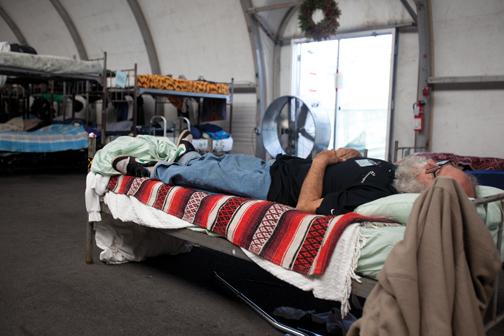
Mother Mary Gayden is a well-dressed woman with a warm smile and a confident personality. At 59, Gayden has ministered for 40 years, and graduated from the San Diego Police Department Academy in 1996. She worked at the San Diego Convention Center for 10 years and says she had a family and a life bursting with potential.
Now, Gayden is staying in a homeless shelter. She found herself widowed and homeless with a severe medical condition and has been living on blood transfusions since 2008. She never thought she would lose her home.
Gayden is currently living in an emergency winter homeless shelter. The shelter is run by Alpha Project, which provides accommodations for more than 200 people and 20 dogs.
The shelter opened on Friday, Nov. 23 and will remain open until April 1, 2013 to provide accommodations for the homeless during the coldest months of the year. The shelter is located on 16th Street and Newton Avenue near downtown San Diego.
Living on the streets instilled Gayden with a sense of compassion and a new outlook on homelessness.
“Even doing ministry, I had a stereotype for why people are homeless and I found out that’s not the case,” Gayden said. “It’s hitting everyone. We have to come together and deal with this.”
According to the San Diego County Regional Homeless Assessment Profile, at a point in time in January 2011, 9,436 people were homeless. Around 3,000 (32 percent) were in transitional housing and 936 (10 percent) were staying in emergency shelters. However, 5,456 (58 percent) had no form of shelter at that point in time.
President and CEO of Alpha Project Bob McElroy said the shelter is a “self-contained city” and one of the most influential resources for the city’s homeless, even though it’s only operational during winter months. The shelter provides homeless people vital resources and care.
“We want people to be lifted up,” McElroy said. “We want them to have a better life, a safe life . . . We’re an empowerment program, not an entitlement program.”
Precedence at the shelter is given to the disabled, elderly and women. According to the Alpha Project, in 2011, 44 percent of those who stayed in the shelter were older than 50 and more than 60 percent of clients had a disability, such as a mental illness, physical disability or other chronic illness.
People with criminal records and former gang members who would normally be turned away from the work force can take advantage of work opportunities offered through the shelter.
Carlos “PeWee” Juarez, an ex-gang member, is a security guard at the winter shelter. He said working at the shelter has been life-changing.
“If I wasn’t here, I’d probably be back in jail,” Juarez said. “A lot of people don’t give us opportunities or jobs because they don’t trust us, because we’re from the streets and from our past records. I’m an ex-felon and I’ve been in prison, but this gives me opportunity to grow and grow with the company. Now I’m a supervisor.”
The shelter provides a support system that creates a respectful community to foster hope and dignity.
Those staying at the shelter receive nightly meals prepared in a county-certified kitchen. Restrooms and toiletries are provided, along with health screenings from the Mobile Clinic for all visitors as well as follow-up treatments for clients with ongoing needs. People at the shelter can also obtain referrals for transitional or permanent housing options, employment opportunities and other support services.
Debby Brown, who is 59 years old, has stayed in the shelter for five seasons. She said the shelter provides her with resources to help her become self-sufficient. She has brought her service dog along with her to the shelter and is grateful for the strong sense of community. Brown says she is on the way out of her plight of homelessness and plans to take advantage of the available resources.
Brown stressed one fact more than anything: the shelter gives her a sense of belonging.
“I don’t want to be recognized for being poor,” Brown said. “I want to be recognized for being me.”







